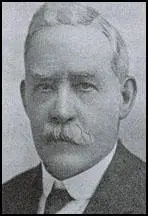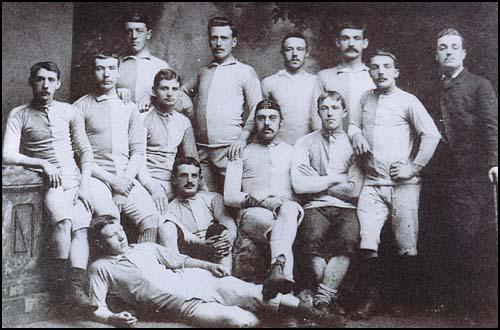John Lewis

John Lewis was born in Market Drayton in 1848. While at Shrewsbury School he developed a keen interest in football.
In 1868 Lewis moved to Blackburn. At this time the town was more interested in cricket than football. According to local historian, Charles Francis: "No purely Association football was played at this time in East Lancashire, though there was a recreation, a mixture of Rugby and Association, known as the Harrow game, at which the the youth of the town, including Mr. A. N. Hornby, were experts."
On 5th November 1875, John Lewis and Arthur Constantine, who also been educated at Shrewsbury School, organized a meeting at the St Leger Hotel in Blackburn to discuss the possibility of establishing a football club in the town. At that time, the game was dominated by former public school students. Seventeen men attended the meeting and it was decided to establish the Blackburn Rovers Football Club. Lewis was appointed as treasurer whereas Walter Duckworth became secretary of the club.
Blackburn Rovers played their first game on 11th December 1875. The team included John Lewis, Alfred Birtwistle, Walter Duckworth, J. T. Syckelmoore, Thomas Greenwood, Harry Greenwood, Jack Baldwin and Arthur Constantine. The game ended in a 1-1 draw. The team played its early games at Oozehead, a piece of farmland on the road to Preston. In 1877 they began playing matches at Pleasant Cricket Ground.

John Duckworth (2), Richard Birtwistle (4), John Lewis (5), Fred Hargreaves (6),
Walter Duckworth (7), Alfred BirtwisGtle (8), Jack Baldwin (9), Thomas
Greenwood (10), Doctor Greenwood (11) and Arthur Thomas (13).
In 1879 John Lewis helped establish the Lancashire Football Association. Later that year he was appointed as Secretary of the Worcestershire Football Association. A post he held for 21 years. Later he served as vice-president of the Football Association and the Football League.
Lewis was also an active member of the Temperance Society. After his football career came to an end he became one of the countries best referees. This included officiating at three FA Cup Finals (1895, 1897 and 1898).
At the age of 60 he refereed the 1908 Olympic Games final at White City. Despite his age he continued to work as a referee and twelve years later Lewis was asked to officiate at the 1920 Olympic Games. He refereed the semi-final between the host nation Belgium and the Netherlands. The Belgian national newspaper L'Action Nationale wrote an editorial on September 4, 1920 which read: "Lewis refereed the game magnificently on Thursday" and supported the idea that the 72 year old should take charge of the final between Belgium and Czechoslovakia.
The match took place on 2nd September, 1920. Belgium took a 2-0 lead and when Lewis sent off Karel Steiner for a bad foul in the 40th minute, the Czech team walked off the pitch. Belgium was therefore awarded the gold medal. The Czech delegation made the following statement in regard to their protest: "The majority of the decisions of the referee Mr. Lewis were distorted and it was obvious that it gave the public the wrong impression in regard to our game. Also both Belgian goals were the result of incorrect decisions of the referee and we seek a rigorous investigation on that point."
John Lewis died on 13th January 1926.
Primary Sources
(1) John Lewis, The Much Abused Referee (1906)
For myself, I would take no objection to hooting or groaning by the spectators at decisions with which they disagree. The referee should remember that football is a game that warms the blood of player and looker-on alike, and that unless they can give free vent to their delight or anger, as the case may be, the great crowds we now witness will dwindle rapidly away.
